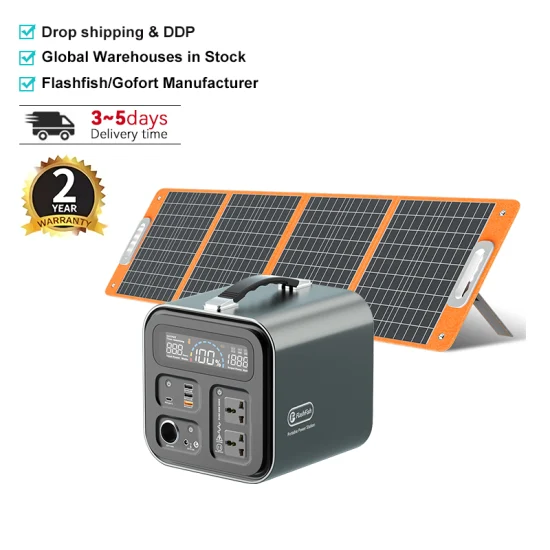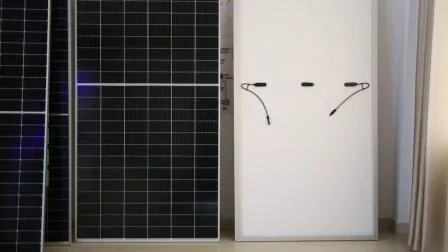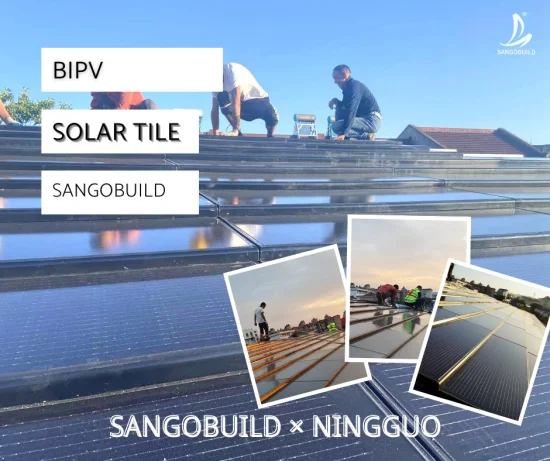
Renewable Energy 2-in-1 Roof and Solar Module System Bapv BIPV Solar Panel Solar Roofing Shingles Solution for Roof Renew
Overview Package size per unit product 130.00cm * 40.00cm * 65.00cm Gross weight per unit product 27.000kg Product Descr
Basic Info
| Model NO. | SANGOBUILD SOLAR ROOF |
| Application | Light Industry; Domestic |
| Condition | New |
| Certification | ISO, IEC61215/IEC61730 |
| Material | Monocrystalline Silicon |
| Model No. | Sangobuild Solar Tile |
| Shape | Plain |
| Color | Black |
| Model | Js35dg-5e 1/2; Js87dg-12e 1/2 |
| Glass | Tempered/3.2mm; Tempered/3.2mm |
| Junction Box | ≥IP67; ≥IP67 |
| Cabel Joiner | Mc4 |
| Fireproof | Classa |
| Operation Temperature | -40ºC to +85ºC |
| Class of Loading | 2400PA |
| Maximum Fuse Rating | 20A |
| Type | Plain Roof Tiles |
| Weight/Piece | 9kg; 16.5kg |
| Battery Size | 182*91mm(2*5); 182*91mm(5*12) |
| Cabel | 450mm / 4mm² 900mm / 4mm² |
| Transport Package | Wooden Box |
| Specification | 1260*480/630*480mm |
| Trademark | SANGOBUILD |
| Origin | China |
| HS Code | 8541420000 |
| Production Capacity | 1000 Pieces/Day |
Packaging & Delivery
Package size per unit product 130.00cm * 40.00cm * 65.00cm Gross weight per unit product 27.000kgProduct Description
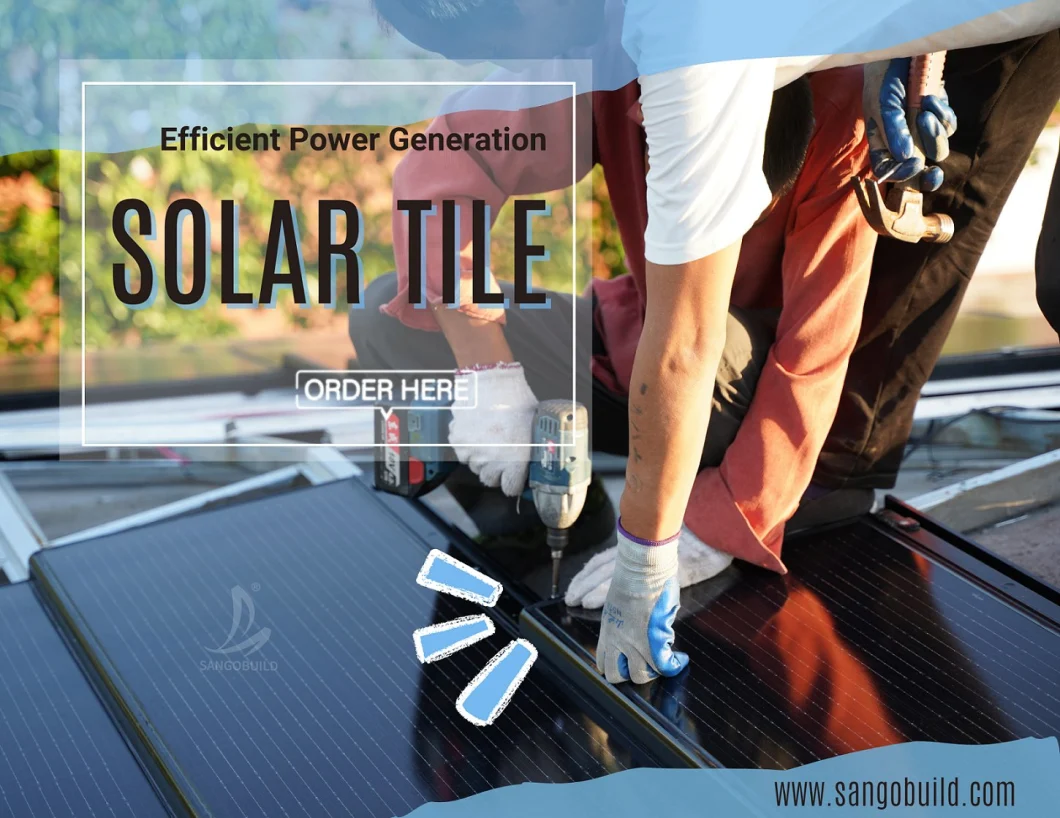
| Product Name | BIPV Solar Panel Powered Roof Structure Home Solar Tile Roofing |
| Material | Tempered glass,PVB/EVA/POB, Solar Cell, Bottom Support |
| MODEL | JS35DG-5e 1/2; JS87DG-12e 1/2 |
| Color | Black |
| Certifications | YUV:IEC61215, IEC61730; CQC; MCS; SII; BIS; Inmetro; SNI; CEC; JET; CL; Carton FootprintIEC 61215, IEC 61730, 3C, ISO 9001:2015, ISO 14001 |
| Effective Size | 1260*480mm/630*480mm |
| CHIP TYPE | Monocrystalline silicon |
| PEAK POWER( Pmax ) | 35W; 87W |
| The Number Of Pavement | 1.65 - 3.31pcs/sqm |
| Packing | 26 pcs/box; 1600-1800 pcs/20' ft container loads |
| LIFESPAN | >30YEARS |
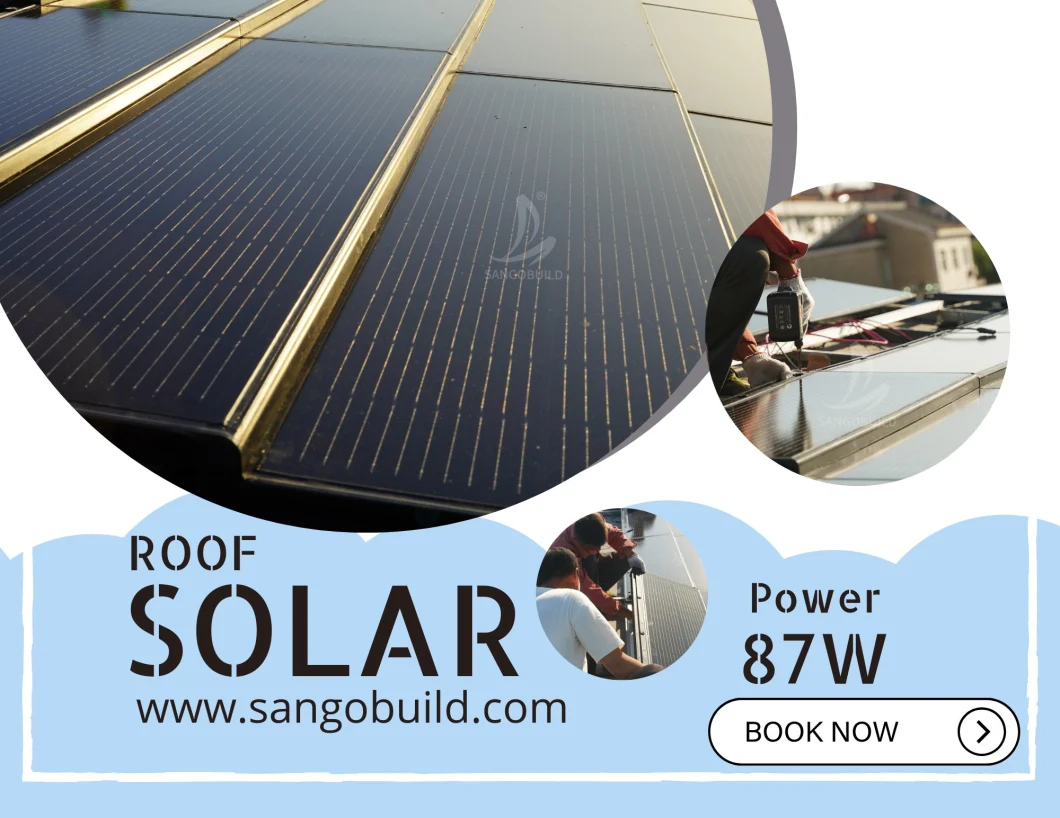
WHAT IS SOLAR TILE
Product Features1.High power generationHigh-efficiency crystalline silicon cell technology, unique packaging process, higher power generation efficiency.2.High SecurityClassA class fire protection, Class 15 instantaneous wind protection, Excellent waterproof and shock resistance, The same life span as the building.3.High loadingSuper strong structural strength, 3 times thestrength of ordinary tiles, no fear of trampling and hail.4.Fashion and beautyTexture color is customizable, Integrated roof design ,Coordinated and beautiful.5.Energy saving and thermal insulationUnique heat dissipation structure can effectively reduce the roof temperature by 5°C.6.Easy installationStandardized modular unit installation, savingtime by more than 50%.
STRUCTURE OF PRODUCT
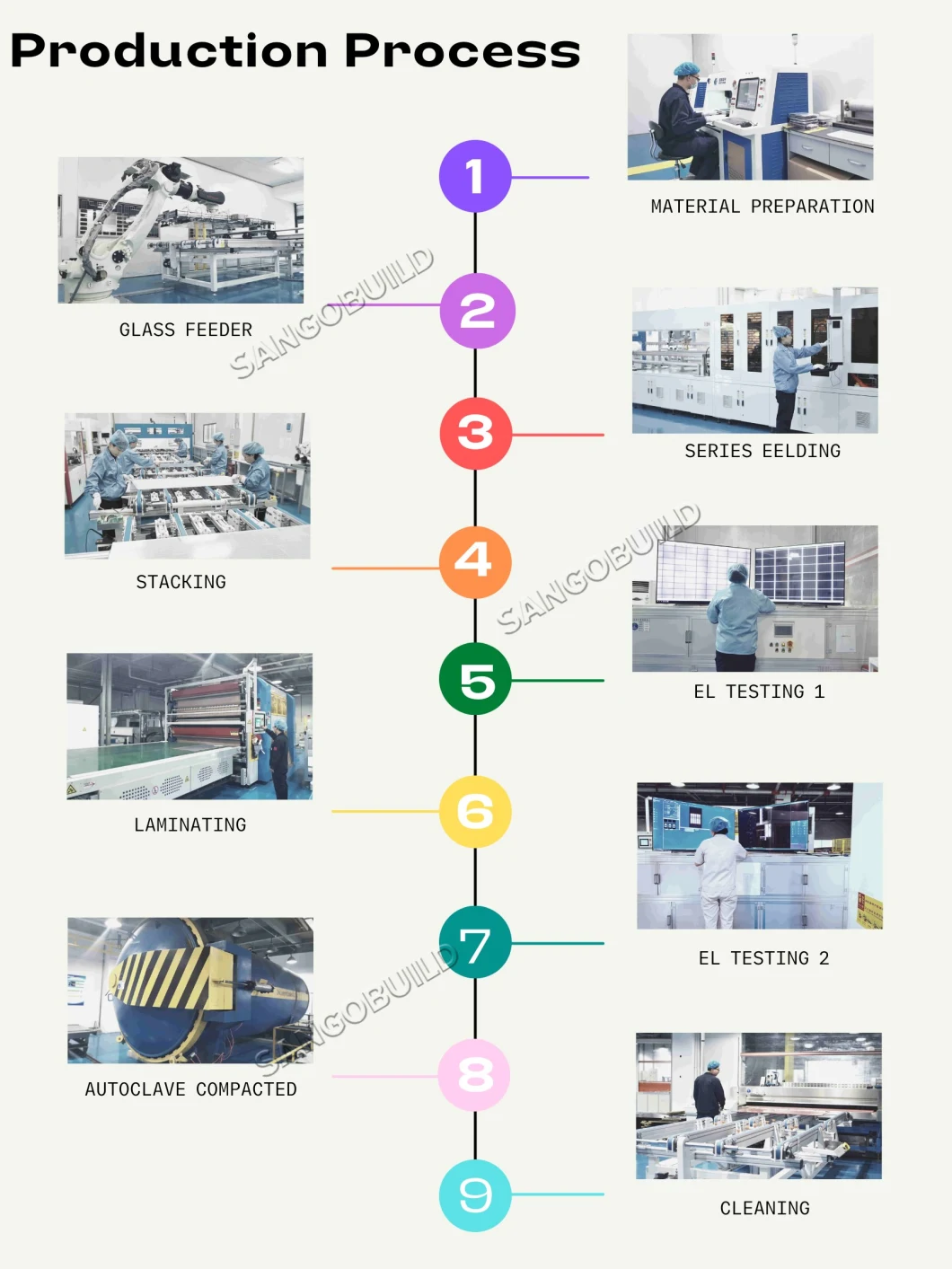
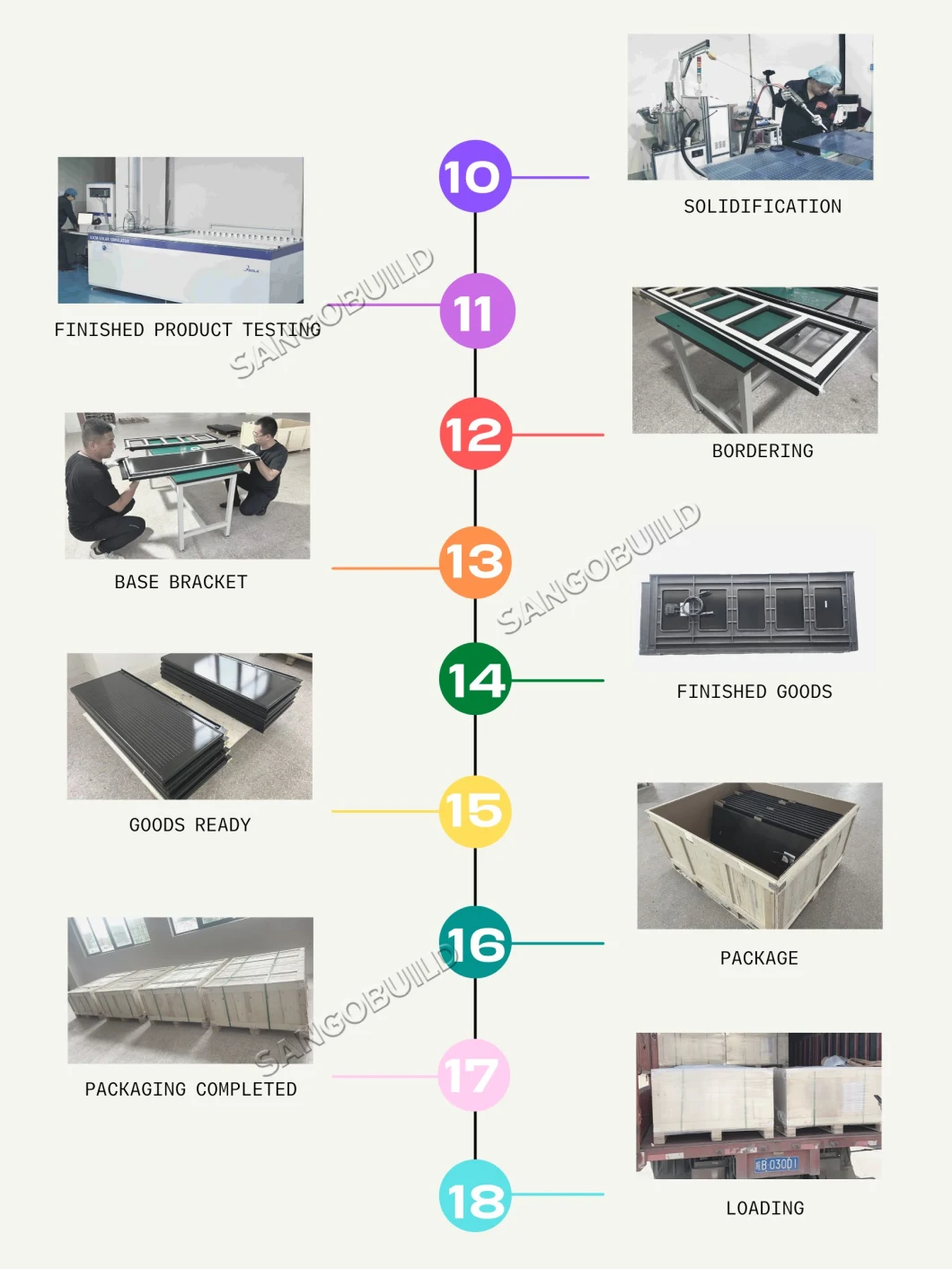
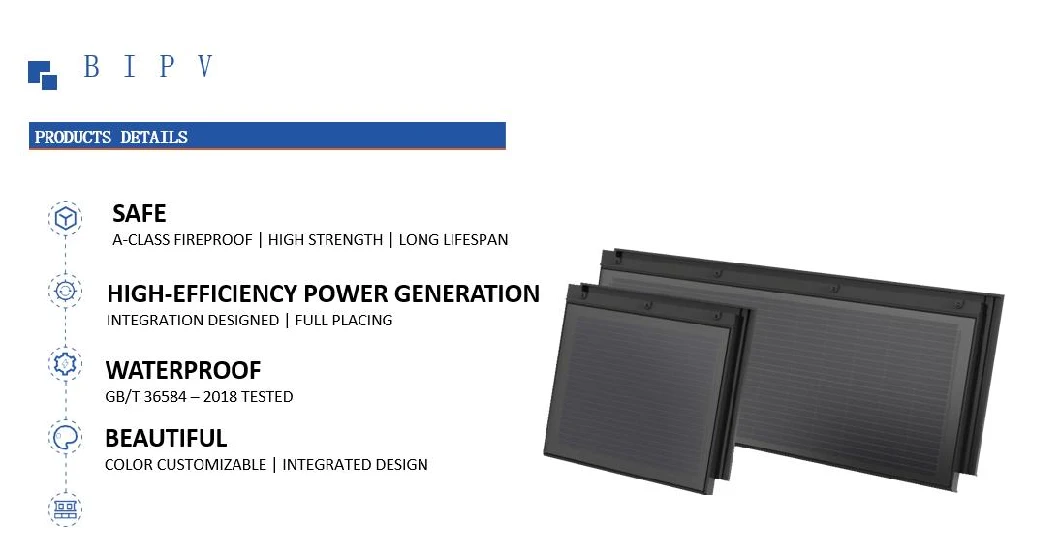
Glass / glass solar panels are the most commonly used technology in energy generating buildings. This technology so far has the highest durability rate against harsh environmental conditions and longer lifespan.
ELECTRIC SYSTEM Product Features of BIPV
1.High power generation
Highefficiency crystalline silicon cell technology, unique packaging process, higher power generation efficiency.
2.High Security
ClassA class fire protection, Class 15 instantaneous wind protection, Excellent waterproof and shock resistance, The same life span as the building.
3.High loading
Super strong structural strength, 3 times the
strength of ordinary tiles, no fear of trampling and hail.
4.Fashion and beauty
Texture color is customizable, Integrated roof design ,Coordinated and beautiful.ACCESSORIES Packaging & ShippingCompany Profile
PROJECTS
FAQQ: Where Can You Install Building Integrated Photovoltaics (BIPV)?
A: The aluminum-zinc steel plate is strong on the other building material. The glue spraying on the surface also adopts new technology.so
our roof tiles can be used for more than 50 years.
Q : What Types of Building-Integrated Photovoltaics(BIPV) Can You Buy?
A :BIPV products used to be exclusively for roofing. This feature makes sense since our roofs generally receive the most direct solar radiation. Most early innovators in BIPV technology focused on replacing traditional roofing with panels, tiles, or shingles that could generate renewable solar energy while protecting the home from the elements. The impetus for this innovation stemmed from asimple economic calculation. Suppose the average cost of a roofing replacement in the USA costs between $5,500 and $11,500. In that case, solar panels that doubled as a roof could essentially "subsidize" part of the cost of going solar.
BIPV products are systems that can function as a component of the building skin or envelope while simultaneously converting solar energy into electricity by serving a dual purpose. Instead of attaching solar panels to a separate roof or façade, BIPV products can offer weather protection, thermal insulation, noise protection, daylight illumination, and even increased safety, along with an independent, clean source of renewable energy for your home. According to one financial analysis, building-integratedphotovoltaic products' total global market size will grow to an astounding $59.5 billion by 2028. As more and more companies rush to enter the BIPV industry, the market could see a compound annual growth rate of at least 20 percent! In practical terms, this means that the options for building-integrated photovoltaics currently available to homeowners and builders will only continue to expand. Prices should also continue to drop as competition stiffens and more innovative products become available. The combination of the plummeting cost of solar energy and innovative technologies in solar energy production (such as thin-film technologies, solar cell efficiency, open-circuit voltage, short circuit current, maximum effect, and fill factor) will almost certainly continue to drive innovation in BIPV products.
Q : How Much Energy Can BIPVs Produce?
A :The exact amount of energy that BIPV products or systems can produce is contextual. The total amount of energy will depend on several environmental factors related to your home location, including: Insolation/Solar Radiation: The average amount of solar radiation your home receives, as calculated by kWh/m2/day, is the most common way to describe the amount of solar resources in a particular area. Check out this tool provided by the US Department of Energy to determine your home's solar radiation potential. Climate and other Weather Conditions: Both scorching summer temperatures and continuously cloudy/rainy conditions can negatively affect the system output for all types of BIPVs. Also, urban areas with high levels of air pollution may increase cleaning and maintenance requirements to ensure the BIPV systems operate at maximum efficiency. Shading Conditions: Though solar technologies today deal better with shady conditions, the presence of trees, buildings, and other structures that block the sun from your home for long periods of the day will reduce the BIPV system energy production.
Q :Are BIPVs Worth It?
A :No! The dead air space between Stone coated metal roofing Panel sand the roof decking combined with the stone coating dampens
exterior noise even in a rainstorm.
Q : How Long do BIPVs Last?
A :Another added economic benefit with some BIPV systems is that they could potentially be much more durable than the building systems/elements they replace. For example, most asphalt shingle roofs have an average lifespan of 15 years. Conversely, most solar shingles will last 25-30 years with only a small drop in efficiency towards the end of that lifespan. The total economic savings associated with a BIPV roof, then, should take into consideration the cost of two roof installations. You could apply the same principle to solar facades and other BIPV systems.
Q : What Is a Solar Shingle(BIPV)?
A :Like solar panels, solar roofing is designed to capture the energy from the sun that is shining on your roof and turn that energy into a usable power source for your home. Though different types of solar roofing products are available, they are all essentially mini solar panels designed to look like and function as conventional roofing materials. The main market driver of solar roofing products was consumer demand for solar panels that were less noticeable and conspicuous. Though some people appreciate the "futuristic" look of a roof clad in solar panels, others lament the loss of traditional roofing appearance. Solar roofing, then, is made to resemble asphalt shingles or slate tiles while also producing electricity. All of the different types of solar roofing are known as building-integrated photovoltaics (BIPV).
Q : How Long Does Solar Roofing(BIPV) Last?
A :Solar shingles and other solar roofing products are lightweight and easy to install. Like all types of roofing alternatives, they are designed to withstand rain, wind, and hail and should easily last for 25 years or more. For example, Tesla's Solar Roof comes with the following specifications/warrantees:
* Tile warranty: 25 years
* Power warranty: 25 years
* Weatherization warranty: 25 years
* Wind rating: ASTM D3161 Class F
* Fire rating: Class A (highest rating)
* Hail rating: ANSI FM 4473 Class 3CONTACT USWelcome to send us an inquiry!
The most service care team is waiting for you!
Send to us




